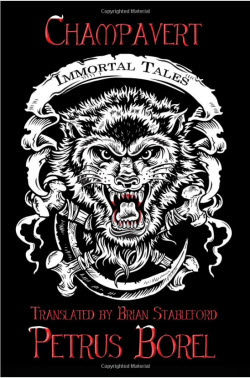Review by Glenn Russell
Outsider tales from the
man-wolf -- masterpiece of 19th century French literature, January
4, 2014
At the time the fiery romantic
literary artist Petrus Borel penned this collection of seven short stories
he was a lycanthrope, that is, a human on the outside, a wolf on the inside.
And as a man-wolf he was an extreme outsider to society and culture, to
convention and rules, to comfort and routine, an outsider telling his
tales as he viewed humans and human society through his wolfish eyes.
And what he saw wasn't pretty: any beauty and purity life offers up is
defiled by twisted, debased bipeds who thrive on vanity, greed, bigotry,
lecherousness and pure evil. Is it any wonder what we encounter in these
pages are `Immoral Tales', tales where Borel's characters act in ways
miles removed from any sense of decency and a standard of right and wrong?
And is it any wonder the reading public who encountered his tales of depravity
and brutality triumphing from the first word of the first sentence to
the last word of the last sentence despised his writing?
So what was man-wolf Petrus
Borel's message? How did he compare to other 18th and 19th century authors
writing as social outsiders? Did he see our retreat from society and human
interactions leading us to spiritual inwardness as did the Danish existential
philosopher Soren Kierkegaard; to aesthetic freedom and ascetic renunciation
as did German pessimistic philosopher Arthur Schopenhauer; to a state
of nature and goodness prior to society as did French political philosopher
Jean-Jacques Rousseau? No, not at all. For Petrus Borel, society and human
life is so poisoned, so diseased, so contaminated to its very core, there
is only one way out: oblivion.
With this worldview of the
man-wolf Petrus Borel, we turn to a few of the tales:
Monsieur De L'Argentiere,
the Prosecutor
Two aristocratic men speak as friends as they partake of a meal together.
We read, "They were leaning voraciously over the table, like two
wolves disputing a carcass, but their dull interlocutions, muffled by
the sonority of the hall, were like the grunting of pigs. One of them
was less than a wolf; he was a Public Prosecutor. The other was more than
a pig; he was a Perfect." As we follow the story we see just what
friendship means here. The Pubic Prosecutor acts with such trickery, such
lecherousness, such sheer evil, that friendship, innocence and love are
trampled, while all along employing reason and logic in his role as Public
Prosecutor. Friendship was one of the keys to a good life in the ancient
Greek and Roman world, championed by such great philosophers as Plato,
Aristotle, Epicurus, Cicero and Seneca. Petrus Borel shows us what friendship
has been reduced to in 19th century Paris.
Don Andrea Vesalius, The
Anatomist
A howling, frenzied mob stands at the gate of a palace, objecting to the
wedding of a young girl to an old doctor who they see as nothing less
than a torturer, a necromancer and a murderer. A handsome capped cavalier,
the young girl's lover, leads the crowd in their attack on the palace.
The attack brings on the king's mounted guard. The crowd is dispersed,
the cavalier wounded. Since, as it turns out, the old doctor is too elderly
and impotent to have relations with his young wife and bride, over the
next four years she has separate rendezvous with three other lovers, including
the capped cavalier, lovers who vanish when she awakes the following morning.
And what happened to these three lovers? In the course of discovering
the truth, we follow the doctor as he leads his young wife to his laboratory.
We, along with his young wife, encounter the grittiest of scenes. The
author writes, "The workbenches were laden with partly-dissected
cadavers; there were shred of flesh and amputated limbs underfoot, and
muscles and cartilage were crushed by the professor's sandals. A skeleton
was hanging on the door, which, when it was agitated, rattled like those
wooden candles that candle-makers hang up as their sign, when they are
stirred by the wind." We find out just how far the old doctor will
go to become a world-famous anatomist.
Champavert, The Lycanthrope
This tale begins with a letter written by Champavert, wherein we read,
"I've often reminded you of that night, when, after having wandered
for a long time in the forest, appreciating all things at their price,
distilling, analyzing and dissecting life, passions, society, laws, the
past and the future, breaking the deceptive optical glass and the artificial
lamp illuminating it, we were sickened with disgust before so many lies
and miseries." Oblivion, according to wolf Champavert is the only
way out, but fortunately for lovers of great literature, on the way to
oblivion Petrus Borel wrote these tales with richly poetic language and
powerful emotions, tales that are (as stated boldly on the book's back
cover) one of the greatest collections ever published. We are also fortunate
Brian Stableford tackled the challenge to translate this collection into
English and provided a 9 page introduction.
|


